Social Work Case Study: Elderly Couple's Needs and Ethical Dilemmas
VerifiedAdded on 2022/08/29
|7
|1861
|17
Case Study
AI Summary
This case study examines the challenges faced by an elderly couple, George and Shirley. Shirley has Alzheimer's, and George, her caregiver, is showing early signs of cognitive decline. The case study explores the application of social work theories, including onion-peeling and faulty-engine theories, to address the couple's needs. It delves into the ethical dilemmas a social worker faces, such as reporting George's condition versus respecting the couple's wishes to remain at home. The study analyzes potential interventions, including caregiver support, community activities, and the involvement of family. It also considers the implications of the CASW Code of Conduct and the steps a social worker should take to ensure the couple's well-being. The assignment concludes with discussion questions regarding alternative interventions, the consequences of reporting George's condition, and strategies for addressing family reluctance to provide care.
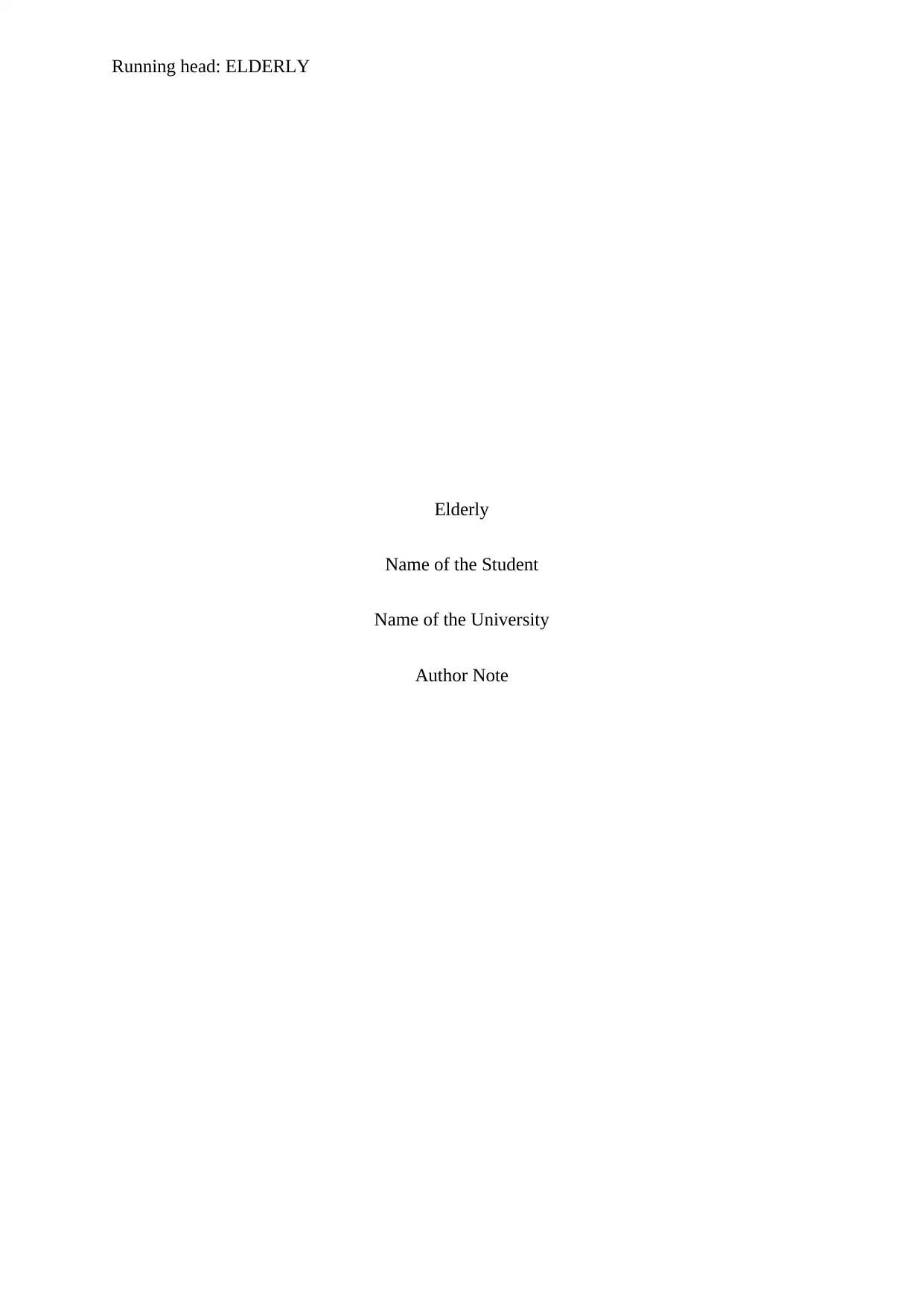
Running head: ELDERLY
Elderly
Name of the Student
Name of the University
Author Note
Elderly
Name of the Student
Name of the University
Author Note
Paraphrase This Document
Need a fresh take? Get an instant paraphrase of this document with our AI Paraphraser
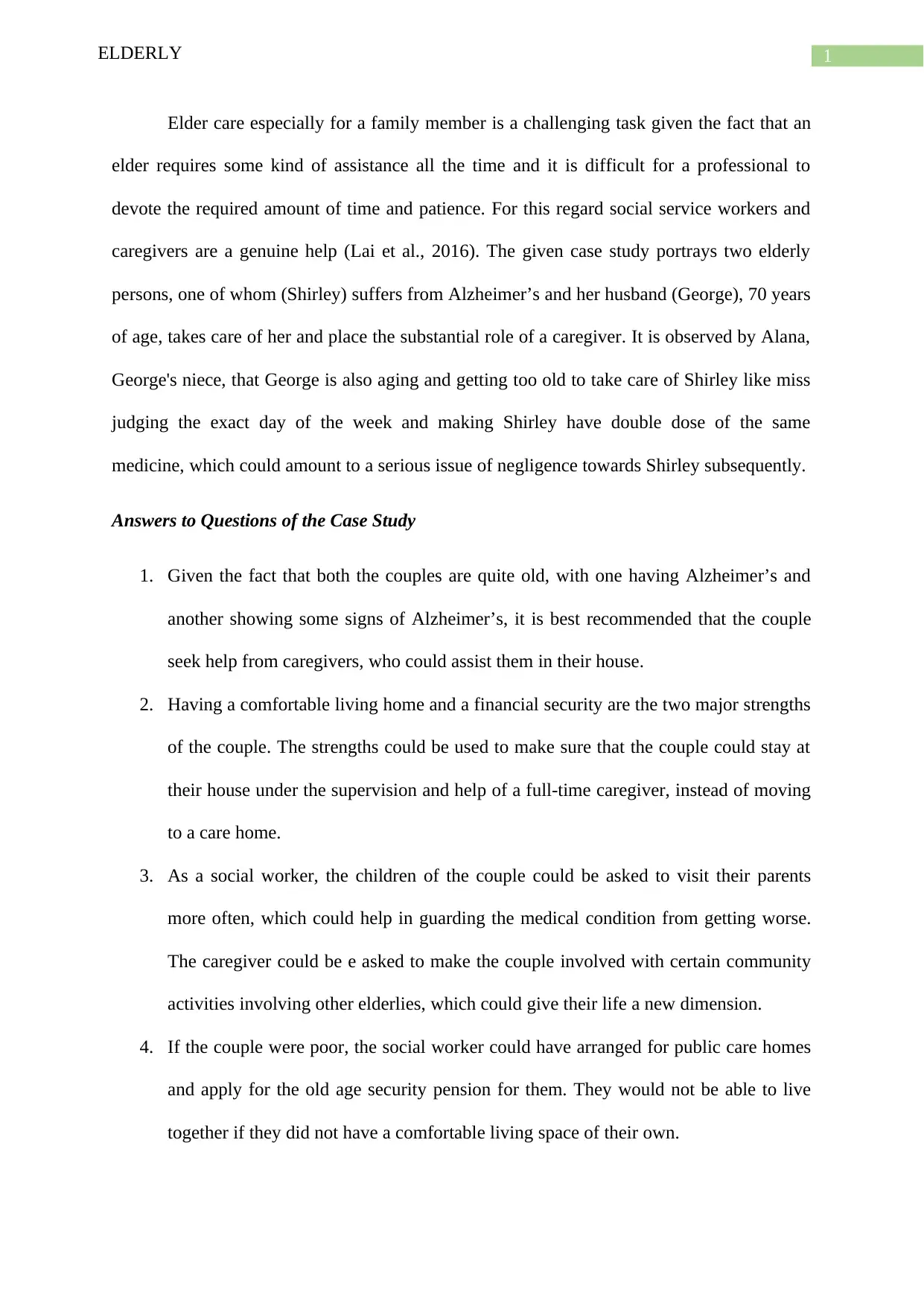
1ELDERLY
Elder care especially for a family member is a challenging task given the fact that an
elder requires some kind of assistance all the time and it is difficult for a professional to
devote the required amount of time and patience. For this regard social service workers and
caregivers are a genuine help (Lai et al., 2016). The given case study portrays two elderly
persons, one of whom (Shirley) suffers from Alzheimer’s and her husband (George), 70 years
of age, takes care of her and place the substantial role of a caregiver. It is observed by Alana,
George's niece, that George is also aging and getting too old to take care of Shirley like miss
judging the exact day of the week and making Shirley have double dose of the same
medicine, which could amount to a serious issue of negligence towards Shirley subsequently.
Answers to Questions of the Case Study
1. Given the fact that both the couples are quite old, with one having Alzheimer’s and
another showing some signs of Alzheimer’s, it is best recommended that the couple
seek help from caregivers, who could assist them in their house.
2. Having a comfortable living home and a financial security are the two major strengths
of the couple. The strengths could be used to make sure that the couple could stay at
their house under the supervision and help of a full-time caregiver, instead of moving
to a care home.
3. As a social worker, the children of the couple could be asked to visit their parents
more often, which could help in guarding the medical condition from getting worse.
The caregiver could be e asked to make the couple involved with certain community
activities involving other elderlies, which could give their life a new dimension.
4. If the couple were poor, the social worker could have arranged for public care homes
and apply for the old age security pension for them. They would not be able to live
together if they did not have a comfortable living space of their own.
Elder care especially for a family member is a challenging task given the fact that an
elder requires some kind of assistance all the time and it is difficult for a professional to
devote the required amount of time and patience. For this regard social service workers and
caregivers are a genuine help (Lai et al., 2016). The given case study portrays two elderly
persons, one of whom (Shirley) suffers from Alzheimer’s and her husband (George), 70 years
of age, takes care of her and place the substantial role of a caregiver. It is observed by Alana,
George's niece, that George is also aging and getting too old to take care of Shirley like miss
judging the exact day of the week and making Shirley have double dose of the same
medicine, which could amount to a serious issue of negligence towards Shirley subsequently.
Answers to Questions of the Case Study
1. Given the fact that both the couples are quite old, with one having Alzheimer’s and
another showing some signs of Alzheimer’s, it is best recommended that the couple
seek help from caregivers, who could assist them in their house.
2. Having a comfortable living home and a financial security are the two major strengths
of the couple. The strengths could be used to make sure that the couple could stay at
their house under the supervision and help of a full-time caregiver, instead of moving
to a care home.
3. As a social worker, the children of the couple could be asked to visit their parents
more often, which could help in guarding the medical condition from getting worse.
The caregiver could be e asked to make the couple involved with certain community
activities involving other elderlies, which could give their life a new dimension.
4. If the couple were poor, the social worker could have arranged for public care homes
and apply for the old age security pension for them. They would not be able to live
together if they did not have a comfortable living space of their own.
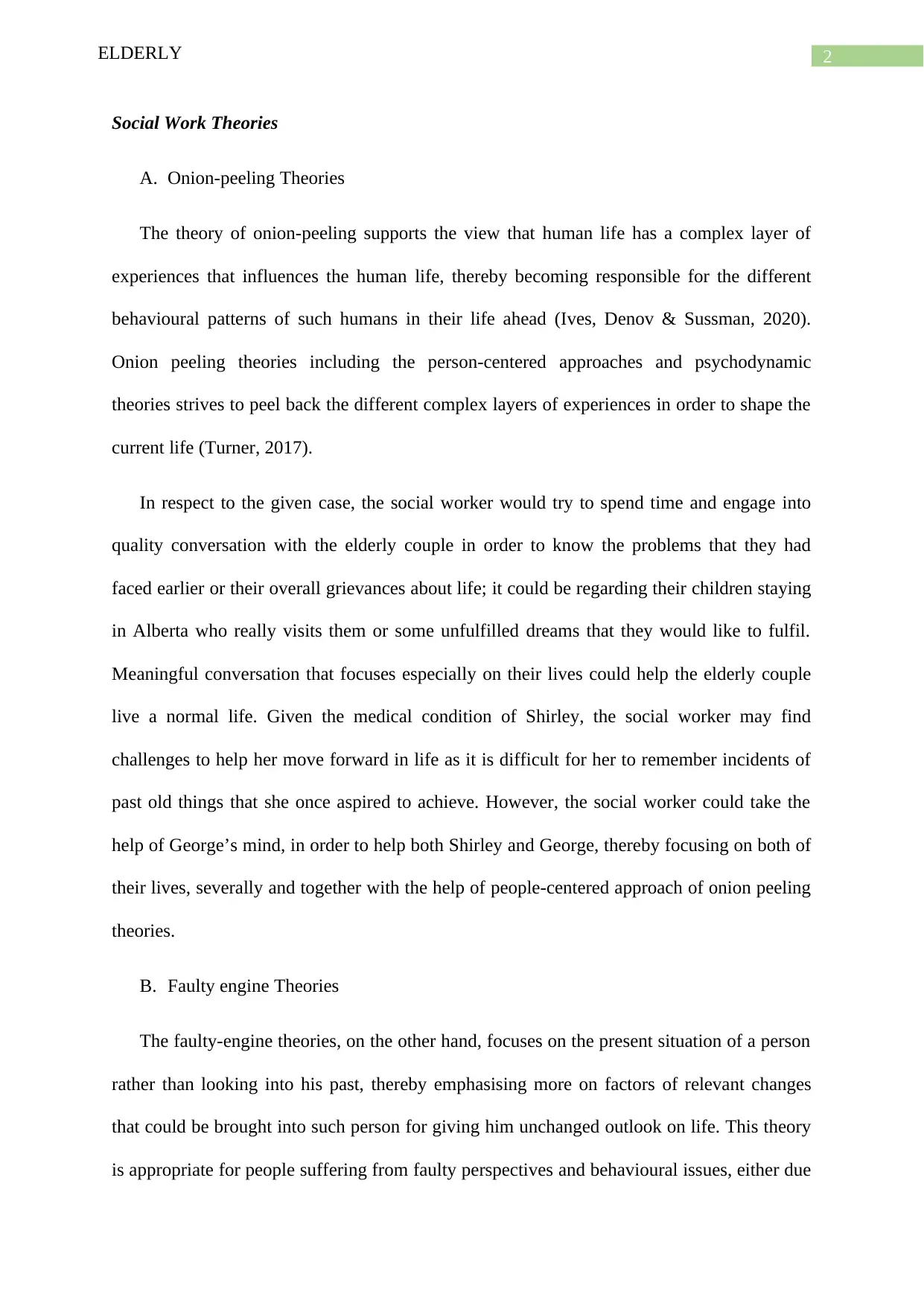
2ELDERLY
Social Work Theories
A. Onion-peeling Theories
The theory of onion-peeling supports the view that human life has a complex layer of
experiences that influences the human life, thereby becoming responsible for the different
behavioural patterns of such humans in their life ahead (Ives, Denov & Sussman, 2020).
Onion peeling theories including the person-centered approaches and psychodynamic
theories strives to peel back the different complex layers of experiences in order to shape the
current life (Turner, 2017).
In respect to the given case, the social worker would try to spend time and engage into
quality conversation with the elderly couple in order to know the problems that they had
faced earlier or their overall grievances about life; it could be regarding their children staying
in Alberta who really visits them or some unfulfilled dreams that they would like to fulfil.
Meaningful conversation that focuses especially on their lives could help the elderly couple
live a normal life. Given the medical condition of Shirley, the social worker may find
challenges to help her move forward in life as it is difficult for her to remember incidents of
past old things that she once aspired to achieve. However, the social worker could take the
help of George’s mind, in order to help both Shirley and George, thereby focusing on both of
their lives, severally and together with the help of people-centered approach of onion peeling
theories.
B. Faulty engine Theories
The faulty-engine theories, on the other hand, focuses on the present situation of a person
rather than looking into his past, thereby emphasising more on factors of relevant changes
that could be brought into such person for giving him unchanged outlook on life. This theory
is appropriate for people suffering from faulty perspectives and behavioural issues, either due
Social Work Theories
A. Onion-peeling Theories
The theory of onion-peeling supports the view that human life has a complex layer of
experiences that influences the human life, thereby becoming responsible for the different
behavioural patterns of such humans in their life ahead (Ives, Denov & Sussman, 2020).
Onion peeling theories including the person-centered approaches and psychodynamic
theories strives to peel back the different complex layers of experiences in order to shape the
current life (Turner, 2017).
In respect to the given case, the social worker would try to spend time and engage into
quality conversation with the elderly couple in order to know the problems that they had
faced earlier or their overall grievances about life; it could be regarding their children staying
in Alberta who really visits them or some unfulfilled dreams that they would like to fulfil.
Meaningful conversation that focuses especially on their lives could help the elderly couple
live a normal life. Given the medical condition of Shirley, the social worker may find
challenges to help her move forward in life as it is difficult for her to remember incidents of
past old things that she once aspired to achieve. However, the social worker could take the
help of George’s mind, in order to help both Shirley and George, thereby focusing on both of
their lives, severally and together with the help of people-centered approach of onion peeling
theories.
B. Faulty engine Theories
The faulty-engine theories, on the other hand, focuses on the present situation of a person
rather than looking into his past, thereby emphasising more on factors of relevant changes
that could be brought into such person for giving him unchanged outlook on life. This theory
is appropriate for people suffering from faulty perspectives and behavioural issues, either due
⊘ This is a preview!⊘
Do you want full access?
Subscribe today to unlock all pages.

Trusted by 1+ million students worldwide
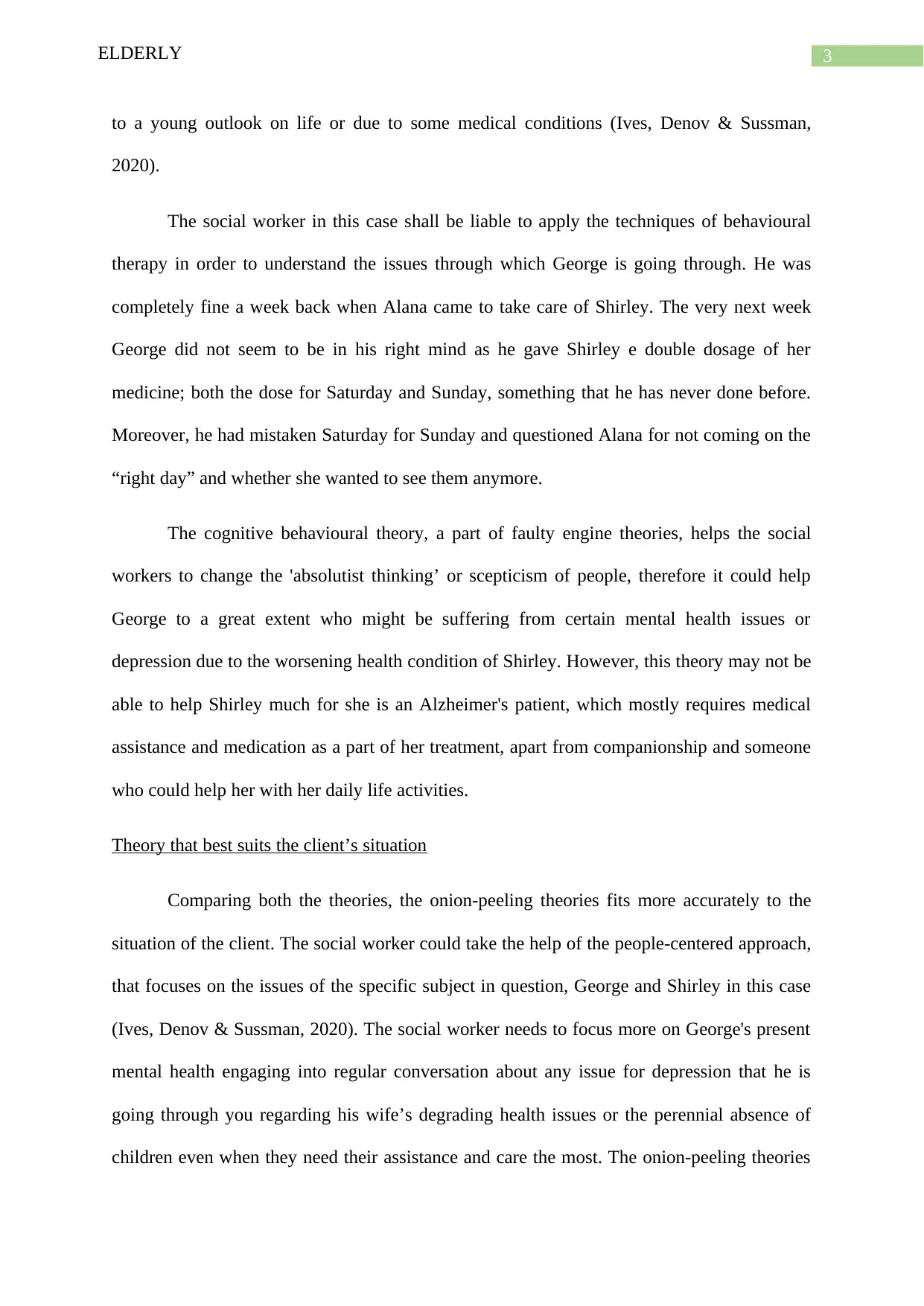
3ELDERLY
to a young outlook on life or due to some medical conditions (Ives, Denov & Sussman,
2020).
The social worker in this case shall be liable to apply the techniques of behavioural
therapy in order to understand the issues through which George is going through. He was
completely fine a week back when Alana came to take care of Shirley. The very next week
George did not seem to be in his right mind as he gave Shirley e double dosage of her
medicine; both the dose for Saturday and Sunday, something that he has never done before.
Moreover, he had mistaken Saturday for Sunday and questioned Alana for not coming on the
“right day” and whether she wanted to see them anymore.
The cognitive behavioural theory, a part of faulty engine theories, helps the social
workers to change the 'absolutist thinking’ or scepticism of people, therefore it could help
George to a great extent who might be suffering from certain mental health issues or
depression due to the worsening health condition of Shirley. However, this theory may not be
able to help Shirley much for she is an Alzheimer's patient, which mostly requires medical
assistance and medication as a part of her treatment, apart from companionship and someone
who could help her with her daily life activities.
Theory that best suits the client’s situation
Comparing both the theories, the onion-peeling theories fits more accurately to the
situation of the client. The social worker could take the help of the people-centered approach,
that focuses on the issues of the specific subject in question, George and Shirley in this case
(Ives, Denov & Sussman, 2020). The social worker needs to focus more on George's present
mental health engaging into regular conversation about any issue for depression that he is
going through you regarding his wife’s degrading health issues or the perennial absence of
children even when they need their assistance and care the most. The onion-peeling theories
to a young outlook on life or due to some medical conditions (Ives, Denov & Sussman,
2020).
The social worker in this case shall be liable to apply the techniques of behavioural
therapy in order to understand the issues through which George is going through. He was
completely fine a week back when Alana came to take care of Shirley. The very next week
George did not seem to be in his right mind as he gave Shirley e double dosage of her
medicine; both the dose for Saturday and Sunday, something that he has never done before.
Moreover, he had mistaken Saturday for Sunday and questioned Alana for not coming on the
“right day” and whether she wanted to see them anymore.
The cognitive behavioural theory, a part of faulty engine theories, helps the social
workers to change the 'absolutist thinking’ or scepticism of people, therefore it could help
George to a great extent who might be suffering from certain mental health issues or
depression due to the worsening health condition of Shirley. However, this theory may not be
able to help Shirley much for she is an Alzheimer's patient, which mostly requires medical
assistance and medication as a part of her treatment, apart from companionship and someone
who could help her with her daily life activities.
Theory that best suits the client’s situation
Comparing both the theories, the onion-peeling theories fits more accurately to the
situation of the client. The social worker could take the help of the people-centered approach,
that focuses on the issues of the specific subject in question, George and Shirley in this case
(Ives, Denov & Sussman, 2020). The social worker needs to focus more on George's present
mental health engaging into regular conversation about any issue for depression that he is
going through you regarding his wife’s degrading health issues or the perennial absence of
children even when they need their assistance and care the most. The onion-peeling theories
Paraphrase This Document
Need a fresh take? Get an instant paraphrase of this document with our AI Paraphraser
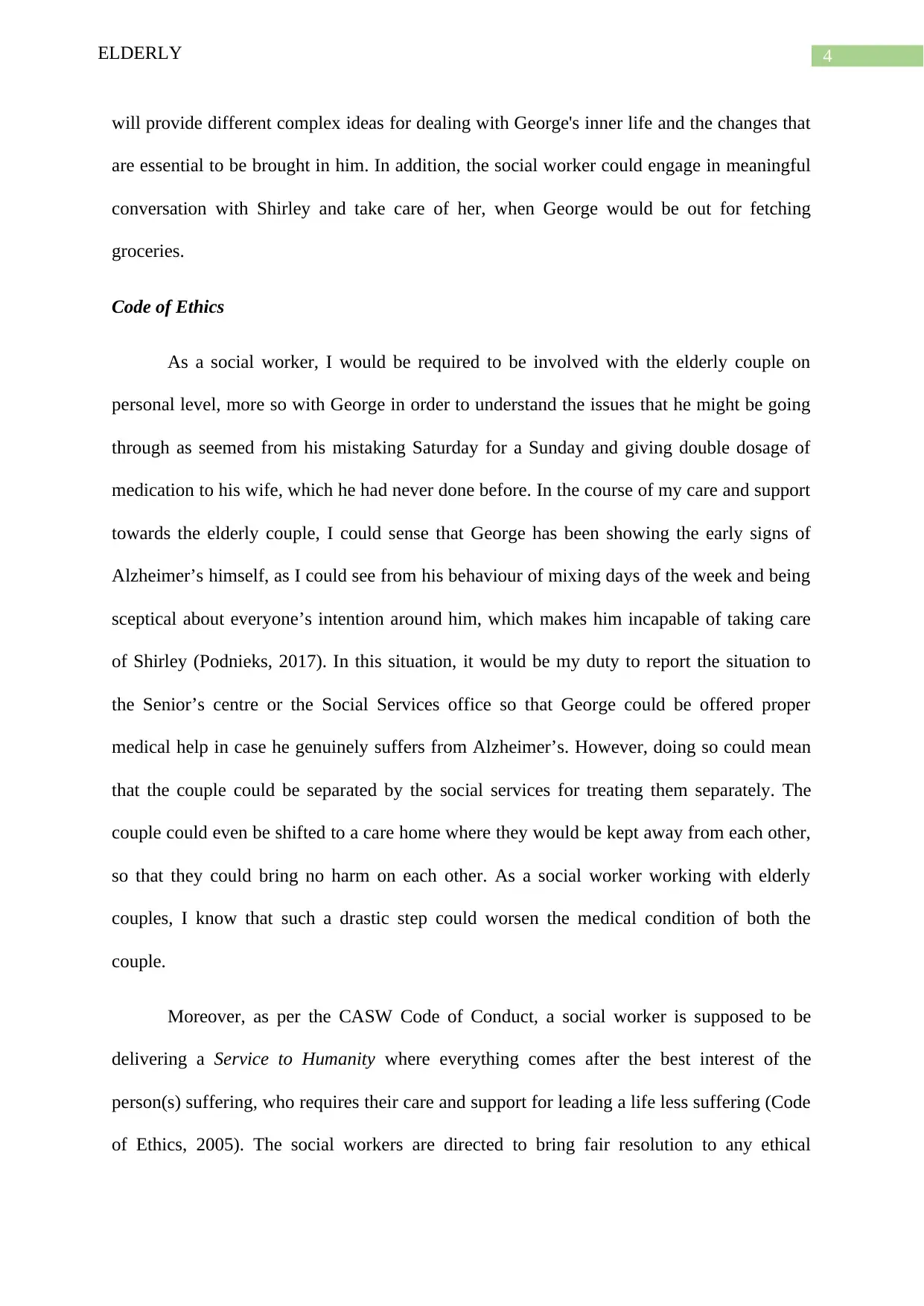
4ELDERLY
will provide different complex ideas for dealing with George's inner life and the changes that
are essential to be brought in him. In addition, the social worker could engage in meaningful
conversation with Shirley and take care of her, when George would be out for fetching
groceries.
Code of Ethics
As a social worker, I would be required to be involved with the elderly couple on
personal level, more so with George in order to understand the issues that he might be going
through as seemed from his mistaking Saturday for a Sunday and giving double dosage of
medication to his wife, which he had never done before. In the course of my care and support
towards the elderly couple, I could sense that George has been showing the early signs of
Alzheimer’s himself, as I could see from his behaviour of mixing days of the week and being
sceptical about everyone’s intention around him, which makes him incapable of taking care
of Shirley (Podnieks, 2017). In this situation, it would be my duty to report the situation to
the Senior’s centre or the Social Services office so that George could be offered proper
medical help in case he genuinely suffers from Alzheimer’s. However, doing so could mean
that the couple could be separated by the social services for treating them separately. The
couple could even be shifted to a care home where they would be kept away from each other,
so that they could bring no harm on each other. As a social worker working with elderly
couples, I know that such a drastic step could worsen the medical condition of both the
couple.
Moreover, as per the CASW Code of Conduct, a social worker is supposed to be
delivering a Service to Humanity where everything comes after the best interest of the
person(s) suffering, who requires their care and support for leading a life less suffering (Code
of Ethics, 2005). The social workers are directed to bring fair resolution to any ethical
will provide different complex ideas for dealing with George's inner life and the changes that
are essential to be brought in him. In addition, the social worker could engage in meaningful
conversation with Shirley and take care of her, when George would be out for fetching
groceries.
Code of Ethics
As a social worker, I would be required to be involved with the elderly couple on
personal level, more so with George in order to understand the issues that he might be going
through as seemed from his mistaking Saturday for a Sunday and giving double dosage of
medication to his wife, which he had never done before. In the course of my care and support
towards the elderly couple, I could sense that George has been showing the early signs of
Alzheimer’s himself, as I could see from his behaviour of mixing days of the week and being
sceptical about everyone’s intention around him, which makes him incapable of taking care
of Shirley (Podnieks, 2017). In this situation, it would be my duty to report the situation to
the Senior’s centre or the Social Services office so that George could be offered proper
medical help in case he genuinely suffers from Alzheimer’s. However, doing so could mean
that the couple could be separated by the social services for treating them separately. The
couple could even be shifted to a care home where they would be kept away from each other,
so that they could bring no harm on each other. As a social worker working with elderly
couples, I know that such a drastic step could worsen the medical condition of both the
couple.
Moreover, as per the CASW Code of Conduct, a social worker is supposed to be
delivering a Service to Humanity where everything comes after the best interest of the
person(s) suffering, who requires their care and support for leading a life less suffering (Code
of Ethics, 2005). The social workers are directed to bring fair resolution to any ethical
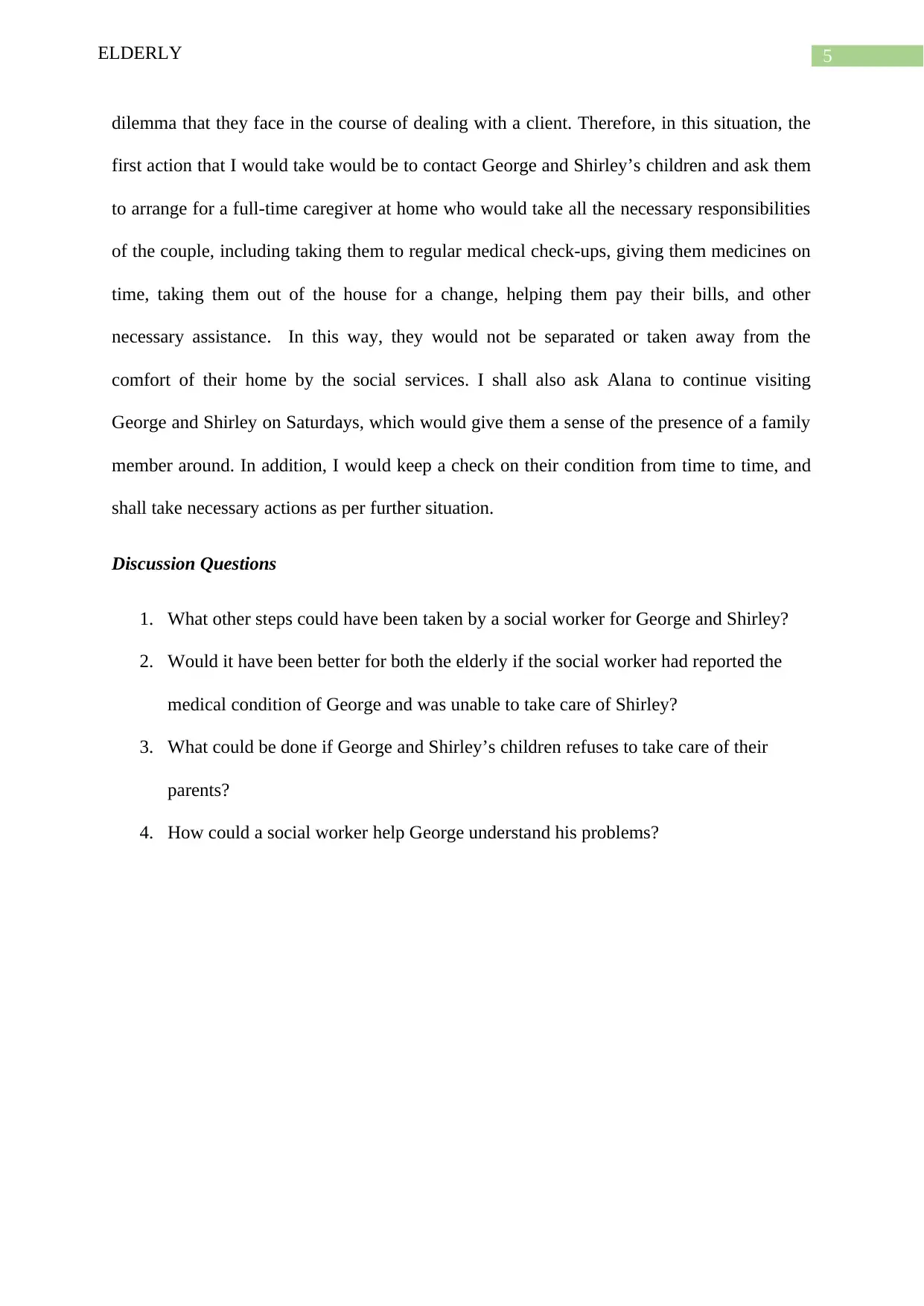
5ELDERLY
dilemma that they face in the course of dealing with a client. Therefore, in this situation, the
first action that I would take would be to contact George and Shirley’s children and ask them
to arrange for a full-time caregiver at home who would take all the necessary responsibilities
of the couple, including taking them to regular medical check-ups, giving them medicines on
time, taking them out of the house for a change, helping them pay their bills, and other
necessary assistance. In this way, they would not be separated or taken away from the
comfort of their home by the social services. I shall also ask Alana to continue visiting
George and Shirley on Saturdays, which would give them a sense of the presence of a family
member around. In addition, I would keep a check on their condition from time to time, and
shall take necessary actions as per further situation.
Discussion Questions
1. What other steps could have been taken by a social worker for George and Shirley?
2. Would it have been better for both the elderly if the social worker had reported the
medical condition of George and was unable to take care of Shirley?
3. What could be done if George and Shirley’s children refuses to take care of their
parents?
4. How could a social worker help George understand his problems?
dilemma that they face in the course of dealing with a client. Therefore, in this situation, the
first action that I would take would be to contact George and Shirley’s children and ask them
to arrange for a full-time caregiver at home who would take all the necessary responsibilities
of the couple, including taking them to regular medical check-ups, giving them medicines on
time, taking them out of the house for a change, helping them pay their bills, and other
necessary assistance. In this way, they would not be separated or taken away from the
comfort of their home by the social services. I shall also ask Alana to continue visiting
George and Shirley on Saturdays, which would give them a sense of the presence of a family
member around. In addition, I would keep a check on their condition from time to time, and
shall take necessary actions as per further situation.
Discussion Questions
1. What other steps could have been taken by a social worker for George and Shirley?
2. Would it have been better for both the elderly if the social worker had reported the
medical condition of George and was unable to take care of Shirley?
3. What could be done if George and Shirley’s children refuses to take care of their
parents?
4. How could a social worker help George understand his problems?
⊘ This is a preview!⊘
Do you want full access?
Subscribe today to unlock all pages.

Trusted by 1+ million students worldwide
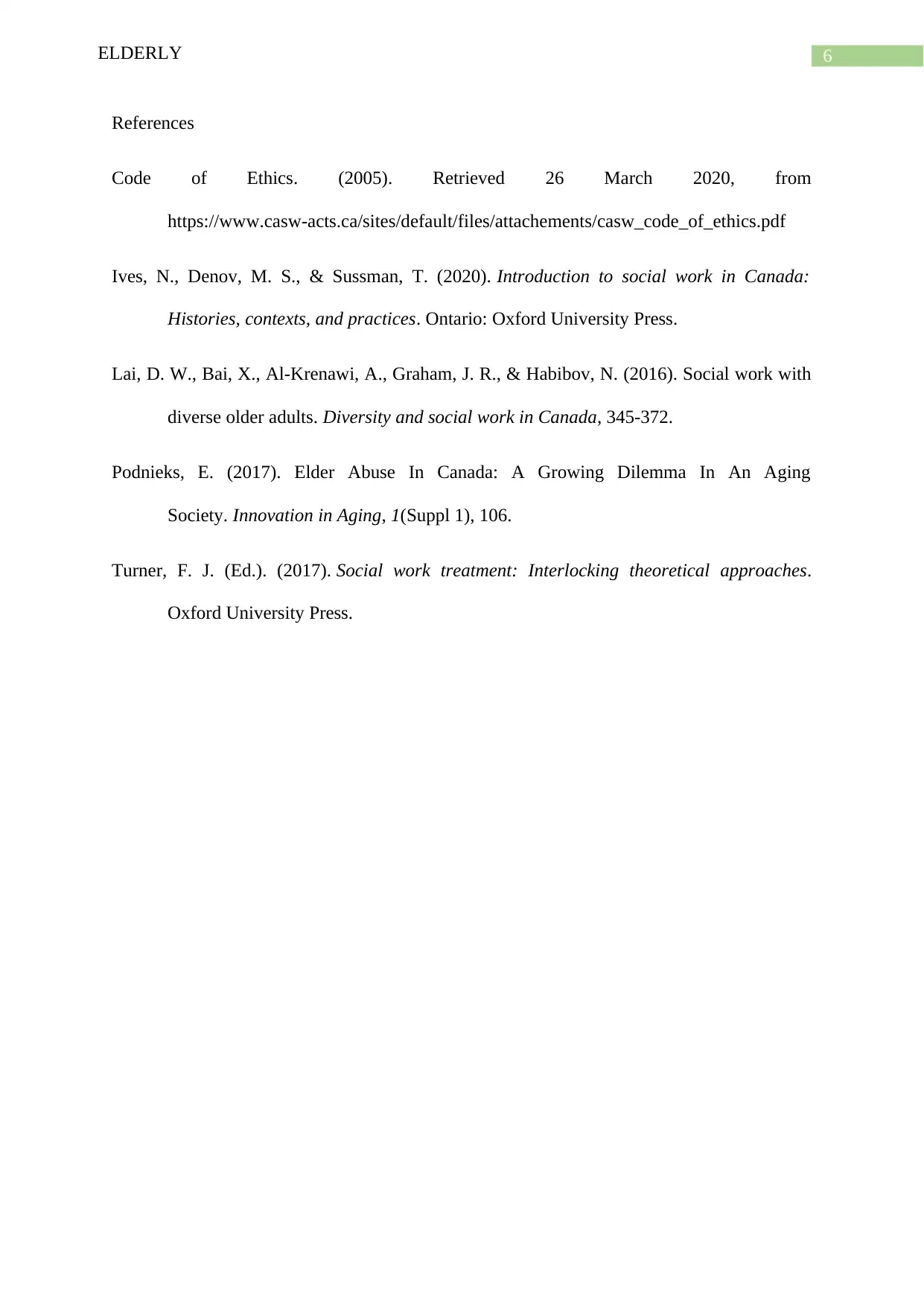
6ELDERLY
References
Code of Ethics. (2005). Retrieved 26 March 2020, from
https://www.casw-acts.ca/sites/default/files/attachements/casw_code_of_ethics.pdf
Ives, N., Denov, M. S., & Sussman, T. (2020). Introduction to social work in Canada:
Histories, contexts, and practices. Ontario: Oxford University Press.
Lai, D. W., Bai, X., Al-Krenawi, A., Graham, J. R., & Habibov, N. (2016). Social work with
diverse older adults. Diversity and social work in Canada, 345-372.
Podnieks, E. (2017). Elder Abuse In Canada: A Growing Dilemma In An Aging
Society. Innovation in Aging, 1(Suppl 1), 106.
Turner, F. J. (Ed.). (2017). Social work treatment: Interlocking theoretical approaches.
Oxford University Press.
References
Code of Ethics. (2005). Retrieved 26 March 2020, from
https://www.casw-acts.ca/sites/default/files/attachements/casw_code_of_ethics.pdf
Ives, N., Denov, M. S., & Sussman, T. (2020). Introduction to social work in Canada:
Histories, contexts, and practices. Ontario: Oxford University Press.
Lai, D. W., Bai, X., Al-Krenawi, A., Graham, J. R., & Habibov, N. (2016). Social work with
diverse older adults. Diversity and social work in Canada, 345-372.
Podnieks, E. (2017). Elder Abuse In Canada: A Growing Dilemma In An Aging
Society. Innovation in Aging, 1(Suppl 1), 106.
Turner, F. J. (Ed.). (2017). Social work treatment: Interlocking theoretical approaches.
Oxford University Press.
1 out of 7
Related Documents
Your All-in-One AI-Powered Toolkit for Academic Success.
+13062052269
info@desklib.com
Available 24*7 on WhatsApp / Email
![[object Object]](/_next/static/media/star-bottom.7253800d.svg)
Unlock your academic potential
Copyright © 2020–2025 A2Z Services. All Rights Reserved. Developed and managed by ZUCOL.




